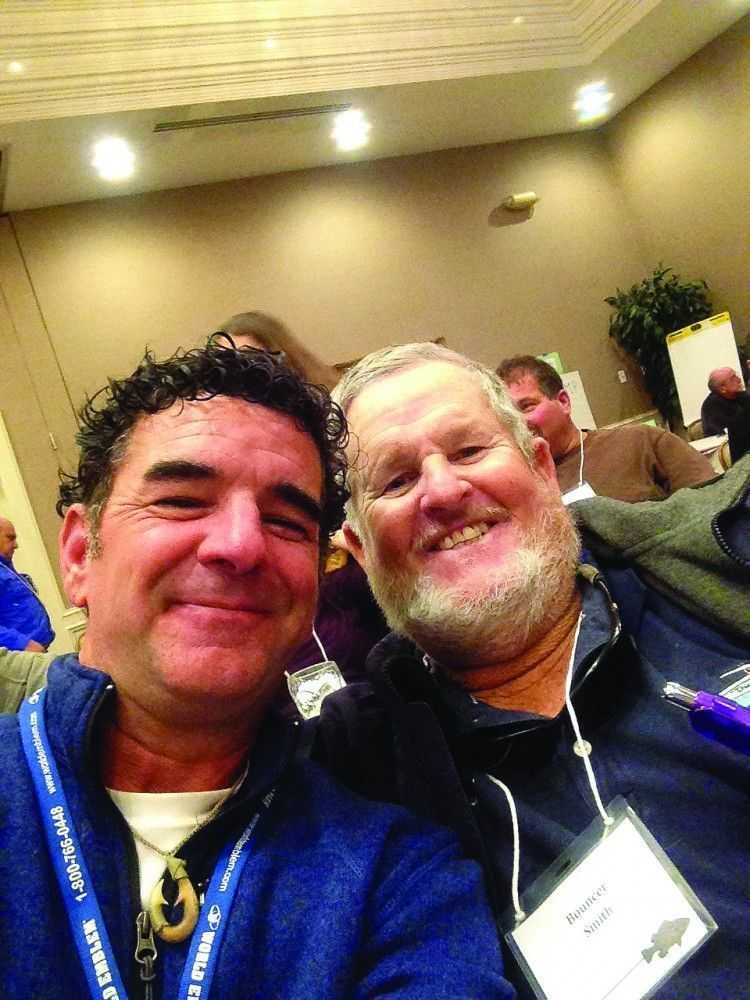Photo caption: The author takes time for a selfie with legendary Miami Capt. Bouncer Smith.
Speakin’ Englis
By Englis Glover
Getting Good Data To Fisheries Decision Makers
What would you think about your data making a difference in the science of fishing? How about filling out a log after every fishing trip you take and making it available to the fisheries governing bodies? Would it be more like “Big Brother” or actually your way to make a difference in getting accurate science on our fisheries?
I was invited in January to attend a workshop hosted by the South Atlantic Fisheries Management Council in Charleston, S.C. This workshop was designed to bring fishermen of the southeast together with scientists and data specialists to better understand and create a plan for a citizen science project that could end up really helping with the poor science or lack of science that makes the fisheries decisions so difficult.
With the vast effects of fisheries closures on many different sectors of the economy, it is important that we try to get the best data for the decisions to be made. The Magnuson-Stevens Act of 1976 turned over all control of the fisheries to several councils, and it was really put back into effect in a serious way in 2006 with the Sustainable Fisheries Act. This is the bible for our fisheries, and with any science that shows a depletion in a species, the councils are legally required to take steps to protect that fishery or species. We have been hearing for years that the data driving these important decisions is not accurate, and it’s apparent in just looking over some of the numbers.
With commercial fisheries having the most to lose in the changes and closures, they are required to post and report catches after each trip. Failure to do so can result in fines as well as losing the privilege to target the very fish that puts food on their families’ tables. Recreational and charter anglers have been involved with small samplings over the last 9 years, including surveys at the dock and phone calls that normally go unanswered or get very little accurate info.
The workshop I attended was designed to put groups together, and through the guidance of fisheries staff as well as special guests from Cornell University, to derive some ideas of how to use citizen science in the recreational sector of the Southeast. I was in a group of incredible fishermen from the Keys to the Outer Banks area. We all have stakes in fishing and all stand to gain from accurate data. Our ideas were all across the board, but we all agreed that recreational fishermen need to have their trips recorded and reported in a more accurate way than sampling. We had several from South Carolina who mentioned the likes of our HIP (Harvest Information Program) that is required for anyone purchasing a migratory bird permit. This is a free permit that requires the hunter to give some harvest information in order to obtain it. It doesn’t seem to be a problem with hunters, and it does give a set of data that would otherwise be impossible to obtain. In fishing, something along the same lines could be successful with recreational fishermen being required to obtain free permits for offshore species with a requirement that trips be reported. The key to accurate data is we report our good trips as well as the bad. I keep a log book, and it is often harder to write down the info on bad trips. But this info could not only help with the data but also with your performance as a fisherman.
As the three-day workshop ended, we were given opportunities as groups to present our ideas to the entire workshop, and I was proud to be a part of a wonderful group of guys that included world-renowned charter Capt. Bouncer Smith, of Miami. This might have been as exciting for me as the entire workshop. Getting to spend time with Bouncer and to hear his stories and his relentless attempt to teach conservation to his clients as well as the hundreds of seminars he has given was very rewarding. People like Bouncer are few and far between, and our sport is fortunate to have him.
These ideas, like most council decisions, are now one to two years away from coming to fruition. I look forward to seeing results from this meeting, and I challenge you to participate in any survey that is asked of you. The data gathered has implications for the fisheries and future access to many species. We can do nothing or we can be proactive and hopefully get a grip on the closures that need to happen and those that are happening for no valid reason.
Visit www.safmc.net for more information.
Tight Lines, Capt. E
